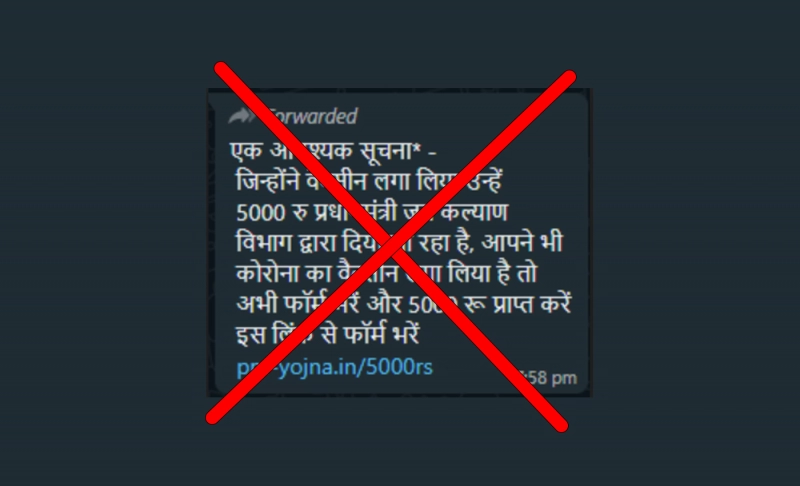By: Shreyashi Roy
September 14 2022

A fraudulent link is being shared on social media with the fake message that the government is offering ₹5,000 to those vaccinated against COVID-19.
Context:
A message claiming that the government of India is offering ₹5,000 to individuals vaccinated against COVID-19 is doing the rounds on social media. The message in Hindi states that Pradhan Mantri Jan Kalyan Vibhag is giving the amount to all who took the vaccine and asks people to register for the same through the link in the message. The message adds that this provision will only be valid till July 30. This message is viral on both Facebook and Twitter and has been in circulation for over a month. However, this is not an announcement from the central government. It is a scam.
In fact:
One red flag was that the announcement was being shared by unofficial sources on social media. To investigate further, we checked the link provided in the message. The website was titled Pradhanmantri Jan Kalyan Yojana. It carries a photo of PM Narendra Modi and some unidentified individuals and repeats the same information as in the viral message. Further, it asks that people fill up the form below to receive the benefit and adds that all family members will be entitled to the same. At the bottom of the landing page are photos of PM Modi and Government of India initiatives such as Make in India, Aarogya Setu, and Beti Bachao Beti Padhao. We noticed here that the URL of this website ends simply with ".in" rather than ".gov.in". The latter is what domain names of websites belonging to the Government of India look like.
Next, we filled up the form on the page, which asks for details such as name, phone number, whether the vaccine was Covaxin or Covishield, and the number of family members. We noticed that the form allows a person to progress to the next step even if the fields are not filled up correctly. Clicking on the 'apply' button at the end of the form then took us to another page, which asks where the individual wants the money to be credited and provides four options: Bank account, Google Pay, PhonePe, and Paytm. The user's name is requested again, and once more, one can progress to the next stage despite filling in incomplete details. On this third landing page, the user is told that they must share the message with at least five people by clicking on the share button provided before they can avail of the ₹5,000 benefit. We found that one does not need to share the message - clicking on the share button five times activates the 'Confirm Rs 5000' button. Clicking on this button then opens a new tab, redirecting users to download an app.
We also checked for more information about the domain name provided in the message. Using the website GoDaddy, we found that the domain was created on September 15, 2021, and is valid till September 15, 2023. While other details about the owner were not available and we found that the website had been registered in Alberta, Canada. Therefore, it is clear that this is a fake message circulated to increase an application's downloads and does not have anything to do with the Indian government.
Further, we came across a news report by Hindustan Times, which carried a tweet by PIB Fact Check, the Centre's fact-checking handle, which called out the viral message as fake and asked people not to forward it. Moreover, on India.gov.in, a government portal that has an exhaustive list of its schemes, we found that no central government initiative by the name of "Pradhanmantri Jan Kalyan Yojana" exists. In fact, it is an amalgamation of the names of two government schemes - Pradhan Mantri Jan Dhan Yojana and Pradhan Mantri Garib Kalyan Yojana.
The verdict:
A fake message meant to increase an app's downloads is posing as an announcement from the government about a ₹5,000 benefit for persons vaccinated against COVID-19. The government is not providing any monetary benefit to individuals vaccinated against COVID-19. We have therefore marked this claim false.
The COVID-19 pandemic has given rise to a lot of potentially dangerous misinformation. For reliable advice on COVID-19, including symptoms, prevention, and available treatment, please refer to the World Health Organization or your national healthcare authority.